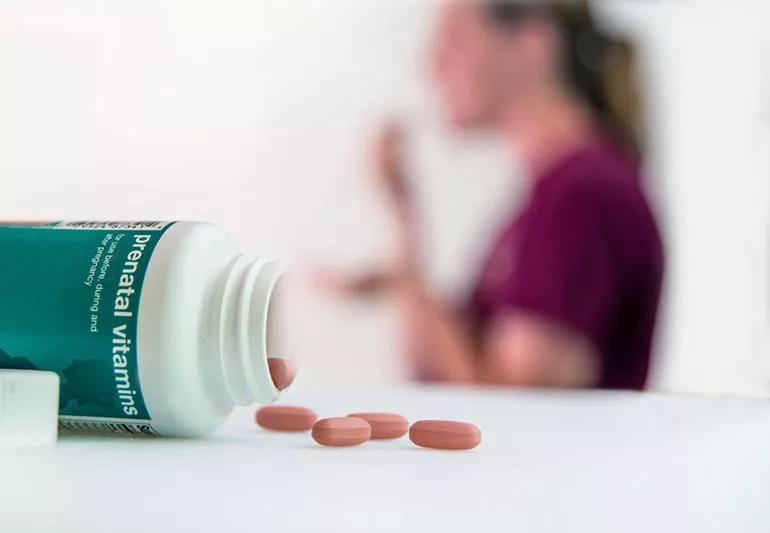The lowdown on folate, calcium, vitamin D and more

Image content: This image is available to view online.
View image online (https://assets.clevelandclinic.org/transform/d7886327-d687-43a1-b389-d711e9e9894e/prenatalVitamins-MC-070120-770x533-1_jpg)
woman taking prenatal vitamins
You load up your plate with colorful produce, lean proteins, whole grains and healthy fats. So if you’re trying to get pregnant, do you really need to take a prenatal vitamin?
Advertisement
Cleveland Clinic is a non-profit academic medical center. Advertising on our site helps support our mission. We do not endorse non-Cleveland Clinic products or services. Policy
While you should try to get your nutrients from food, even the healthiest of eaters might not get all of what they need — and when you’re growing a little one inside you, it’s good to have some backup. (Plus, that kale salad might not sound so good in a few months.)
“Prenatal vitamins can give you that extra assurance that you’re getting an adequate amount of vitamins and minerals that help make you healthy,” says certified nurse midwife Shellie Hawk, CNM.
They’re specially formulated with safe doses of key nutrients that pregnant people need. “With certain vitamins, you don’t want to overdose, so taking it in the form of a prenatal helps you make sure you’re staying in the safe range,” she says. “Should you need extra iron or folic acid, your healthcare provider will counsel you about that.”
If you’re thinking of conceiving, you’ll want to start supplementing with folic acid a few months before you start trying — and using a prenatal vitamin is a good way to do that, Hawk says.
“If you’re not going to take a prenatal ahead of time, then you should probably be supplementing with folic acid by itself,” she adds.
This B vitamin has been shown to prevent birth defects involving the brain and spine. It’s hard to get from food, so the American College of Obstetricians and Gynecologists (ACOG) recommends that all pregnant people take a daily vitamin supplement containing 400 micrograms. “Most over-the-counter prenatals have plenty of folic acid,” Hawk says. But if you’ve previously had a baby with neural tube defects, your provider may prescribe one that has more.
Advertisement
“Those who are pregnant need calcium not only for their bones but for the development of the baby’s bones,” Hawk says. Studies have also found that women who supplement with calcium during pregnancy reduce their risk for hypertension and pre-eclampsia. ACOG recommends that women age 19 and older get 1,000 mg per day of calcium through food and/or supplementation.
Vitamin D helps your body absorb the calcium that builds your and baby’s bones and teeth. Although we can get it from sun exposure and certain foods, most Americans do not get the recommended amount, which is about 600 IUs per day.
Vitamin B6 may help curb nausea and vomiting from morning sickness. And, Hawk says it’s even more effective when it’s combined with an antihistamine called doxylamine, which is available over-the-counter. The National Institutes of Health recommends that pregnant people get 1.9 milligrams of B6 each day.
DHA is an omega-3 fatty acid that is important in fetal brain development. You can get DHA from seafood (be sure to choose varieties that are low in mercury, such as salmon, tilapia or cod) or through supplementation. Not all prenatal vitamins contain DHA; if you choose one that doesn’t, you may want to use an additional fish oil supplement, Hawk says.
Having adequate iron levels during pregnancy enables your body to carry ample amounts of oxygen to the growing fetus. Most prenatal vitamins contain the recommended 27 mg of iron, but keep in mind that your body absorbs iron better from food (such as red meat, poultry and fish) than from supplements. If you have iron-deficiency anemia, your provider will recommend additional supplementation, Hawk says.
Remember, though, you can’t supplement yourself out of a bad diet. Making good food choices during your pregnancy will help you feel as good as possible and support your baby’s future health.
Advertisement

Delivered every Tuesday!
Sign up for our Health Essentials emails for expert guidance on nutrition, fitness, sleep, skin care and more
It's a letter about the news!

Every two weeks once
Sign up for our Health Essentials emails for expert guidance on nutrition, fitness, sleep, skin care and more.
Learn more about our editorial process.
Advertisement
An expert outlines the best timing options
Talk with them about their new sibling early and often
B vitamins do a lot for your body, like activate enzymes that give you energy, create blood cells and prevent DNA damage
Dental care is not only safe during pregnancy, but it’s also highly recommended
A healthy pregnancy diet includes good amounts of folic acid, DHA, calcium and more
If left untreated, you risk complications, early labor and passing the infection to your baby
Lifestyle changes, like a healthy diet and exercise, can help with fertility issues
Always talk with your doctor for advice, too
Type 2 diabetes isn’t inevitable with these dietary changes
Applying a hot or cold compress can help with pain
Pump up your iron intake with foods like tuna, tofu and turkey